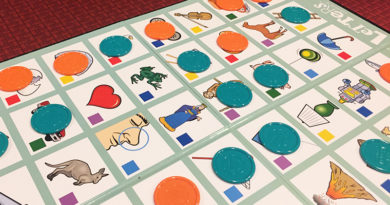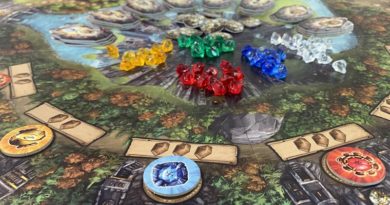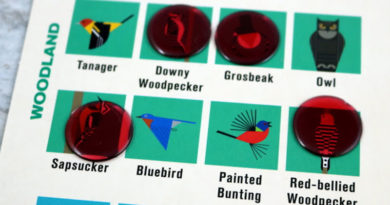Founders of Teotihuacan board game review
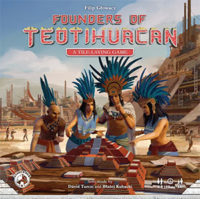
Perhaps the first question you’ll have when you see our review of Founders of Teotihuacan is “How should I pronounce Teotihuacan?”
Our answer to that is, “However you’d like.”
That way you can move right on to the next question, “Is it fun to play?”
And for that we respond, “It depends on what type of fun you like in your board games.”
First, though, is a very brief history lesson:
As you can read about on History.com, “Teotihuacan is an ancient Mesoamerican city located 30 miles (50 km) northeast of modern-day Mexico City.
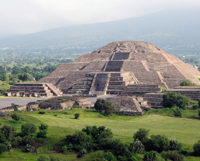
The city, which was designated a UNESCO World Heritage Site in 1987, was settled as early as 400 B.C. and became the most powerful and influential city in the region by 400 A.D. By the time the Aztecs found the city in the 1400s and named it Teotihuacan (meaning “the place where the gods were created”), the city had been abandoned for centuries. Teotihuacan’s origins, history, and culture largely remain a mystery.”
And for purposes of the board game, Founders of Teotihuacan, by Board&Dice, it’s good to know that Teotihuacan is known as the site of many of the most architecturally significant Mesoamerican pyramids built in the pre-Columbian Americas.
Which is why players will be constructing a central pyramid, temples, and other buildings to score the most points and be the best founder.
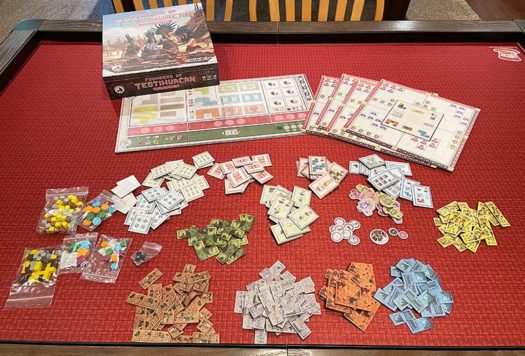
How to play Founders of Teotihuacan
The goal of Founders of Teotihuacan is to create the best-designed city of Teotihuacan. Players will place their limited disks on action spaces to perform actions such as constructing buildings, temples, and a central pyramid. They’ll also have to gain and manage resources from their buildings in order to pay for their temple and pyramid tiles. Once the eclipse comes (after a certain number of rounds), players total their scores and crown a victor.
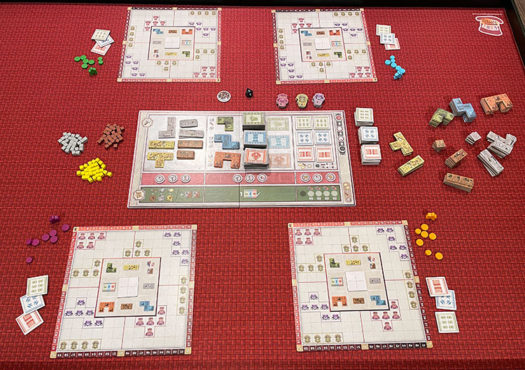
Set Up
As you can see in the photos, there are a lot of tiles, token, and cubes in the game. So while we won’t outline the full game set up, we’ll cover the basics.
The central board is comprise of 3 main sections where players will take their actions. And in each of those 3 sections, there are 2 options. The area above the action disk row is for Building and the areas below are for Influence. When a player places their action disk, they can choose to either take the Build action above it or the Influence action below.
The left section is where Building tiles are placed and the amount available in each round depends on the number of players. The central section is loaded with Temple tiles and their associated stack of Worship tiles. The right section has the Pyramid tiles (2 of each color available).
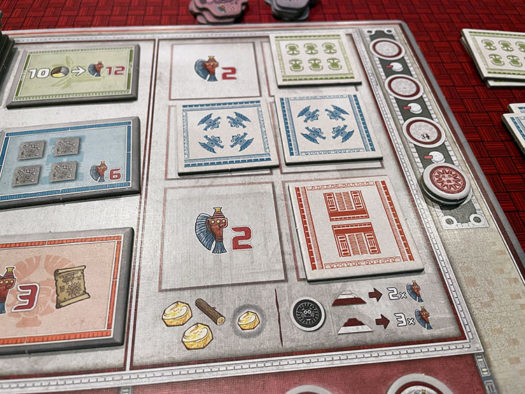
The action row is comprised of circles and each round starts with players randomly placing the circular Bonus action tokens on each of those spaces.
All of the Mask tiles are stacked according to color with the highest value on top. And all of the other tiles and cubes are set into general supply piles.
Each player takes their own player board and the Worker and disks of their chosen color. The player boards are double-sided and players can choose whether they’re going to all play using the A or B sides. Each player places their Worker to the designated side of their board. This will impact in which areas of their board they’ll be able to build on during their turn.
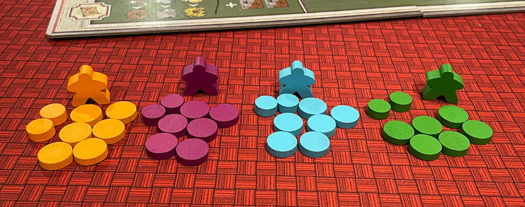
Lastly, each player also starts by placing their white pyramid tile in the center of their board and then 1 of each pyramid tile color in the pyramid area of their choice. They’ll also claim the reward from wherever they place those tiles (rewards are printed on the player boards).
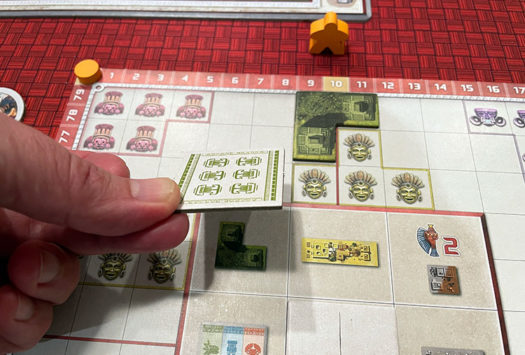
Player Turns – Build or Influence
On a player’s turn, they’ll take one or more of their disks and place it/them on one of the central board action spaces. Then they’ll perform the action associated with that section (either Build or Influence).
If they choose to Build, they must pay attention to the height of the stack of tokens in that action space as that determines their Strength. For example, if they place 1 of their disks in the left area on top of a bonus action token, their Strength will be 2 and they’ll be able to construct a size 2 Building tile. However, if the disk they place makes the stack 3 high, they’ll be able to construct a size 3 building.
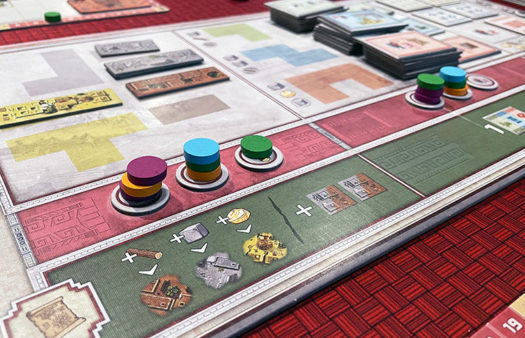
The issue with Strength applies to the central Temple tiles area and the right side Pyramid tiles area. However, both the Temple and Pyramid also require resources to construct. Those resources may be taken from anywhere on a player’s board and paid to the general supply. In both of these cases, a player may construct a temple or pyramid tile that’s more than their strength by paying additional resources (depicted in the shaded area next to the tile spaces).
After a player takes a tile from the central board Build areas, they add it to their board. However, they can only place them in areas that their Worker can Reach. The Worker’s Reach is the half of the board from where the Worker stands. For example, if the Worker is below a player’s board, they may only place their newly constructed tiles in the areas on the bottom half of their board.
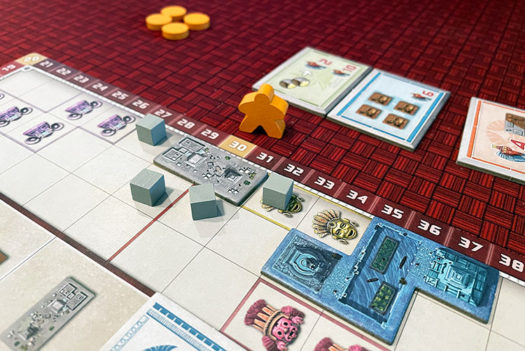
There are some situations where the Worker’s Reach is ignored, but for basic Build actions, they must be adhered to.
- When a player Builds a Building (left area of the central board), after placing it on their board, they produce the matching resources (wood, stone, or gold). They place a cube of that resource in each empty space orthogonally adjacent to that newly placed building. If placing a tile covers the last space of a cluster of masks, they also take the top Mask token of that type from the stack.
- When a player Builds a Temple, they also take one of the face up Worship tiles in that temple’s color. (They won’t score points from that Worship tile though until they take a certain Influence action later.)
- When a player Builds a Pyramid tile, if they cover up an icon on the bottom level of the pyramid area, they also immediately get that reward (typically extra building or temple tiles).
If the player chooses to Influence instead of Build, they use their action from the areas below the action row. The left area allows players to gain more resources or add 2 size 1 buildings to their board. The central area allows players to turn in one of their Worship tiles for points. The right area allows players to move along that track to gain more victory points and may choose to exchange one of their Worship tiles.
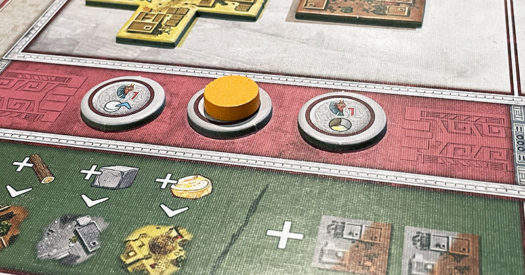
Also, whenever a player places their action disk and they are the first to place on top of a bonus action token, they may take that bonus action. These bonus actions are things like extra builds, extra influence, or resources and increasing strength.
After a player takes their turn, they move their Worker in a clockwise direction to the next side of their player board. Thus, on their subsequent turn, the player will be able to Build in that half of their board.
After doing their Build or Influence action, play proceeds to the next player in turn order. Players continue taking turns placing disks and taking actions. Once all players have used all their action disks, the round ends. Players retrieve their actions disks and then permanently remove one from the game. Thus, in each subsequent round, players will have one less disk for actions. Players also restock the building, temple, and pyramid areas on the central board as well as randomly setting out the bonus action tokens to start a new round.
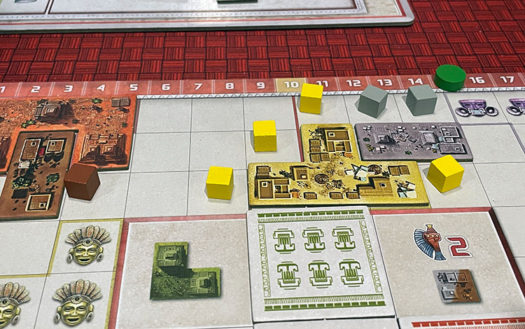
Final Scoring
Players continue taking turns and going through the various rounds until the end of the 3rd or 4th round (depending on number of players). Then they total scores.
Players will score many points throughout the course of the game while taking their actions and gaining Masks. As they gain points, they’ll move their score marker around their player board.
At the end of the game, players add up their additional victory points from Temple and Pyramid tiles for each quadrant (District) of their board. For each of the 4 Districts, they score for each pyramid tile that is either fully or partially in that District.
- If the pyramid tile is on the bottom level, score 2 victory points for each Temple tile of that matching color in that District (fully or partially).
- If the pyramid tile is on either the 2nd or top level, score 3 victory points for each Temple tile of that matching color.
The player with the most points is the winner!
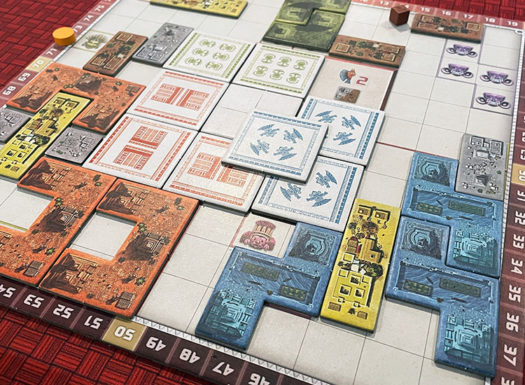
Can the whole family enjoy Founders of Teotihuacan?
If you’re familiar with our board game reviews, you’ll know that we love tile-laying board games. So when we saw that Founders of Teotihuacan was a tile-laying game, it immediately caught our attention.
Yet, there’s a lot more going on in the game than simple tile-laying. That’s because there’s a lot more to think about each turn and each round than filling your board.
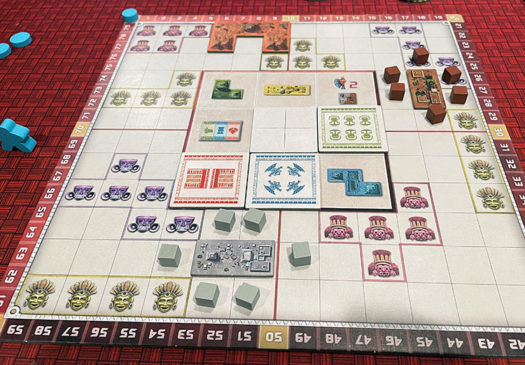
Just looking at the tile-laying aspect of the game, there is even plenty to consider.
First of all, you need to pay attention to where your Worker is and will be each turn. Since you can only place tiles in the areas in front of your Worker, timing of placement is a factor.
Next, you’ll find yourself paying attention to the mask icon clusters on the board and trying to cover them up quickly so you can score the higher-value mask tokens.
Then there’s the factor of 3 different types of tiles to place on your board in different areas. For example, you’ll want to place Temple and Pyramid tiles of the same color in the same areas to score large end-game victory points. So you need to think of playing the long game to score well there.
If that weren’t all, you’ll also need to carefully consider where to place Building tiles since those are what produce resources. If you fit them in too nicely, then there will be less empty spaces next to them to place resource cubes.
See, isn’t that a lot to think about in just the tile-laying element of the game?
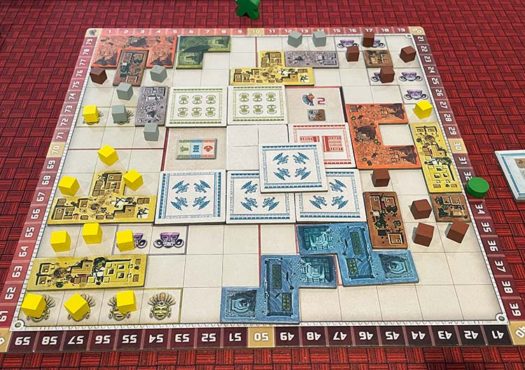
But there are even more choices thrown into the mix throughout the game.
Also related to the tile-laying aspect is one very important factor to consider when choosing which tile to even take is the size of the tile you want to build. Because you’ll need to place enough action disks on an action space in order to have the Strength to heft that size tile to your board.
Then there’s the whole factor of choosing Influence instead of Building on your turns. There will be times when you need extra resources or want a couple of small buildings. Or you may finally want to get points for the Worship tiles you’ve collected. Those all require Influence actions instead of building.
And how about those bonus action tokens? You may not get a lot of strength by placing first on an action space, but you’ll get the chance to take an extra action.
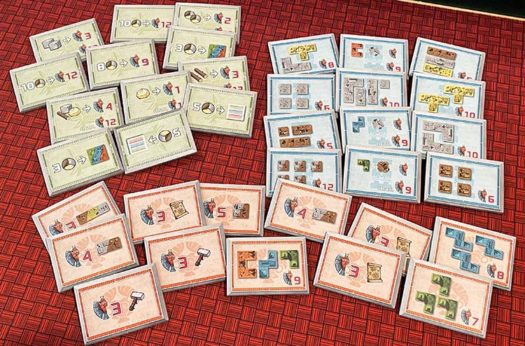
And if that’s not enough, there are also the rewards you can claim when you place your bottom layer of your pyramid.
So, yes, there’s much more to think about in a game of Founders of Teotihuacan than your typical tile-laying game. And that’s why we stated at the beginning of our review that the enjoyment found in the game depends on what you like in your games.
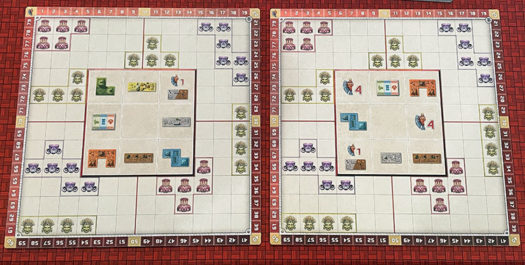
If you’re looking for simple tile-laying games with a only a few choices, then this game isn’t for you. For that we’d recommend games like NMBR 9, Carcassonne, Kingdomino, Barenpark, Karuba, Queenz, My City, or Lanterns.
On the other hand, if you like a lot of strategic choices to consider continuously in a board game, then Founders of Teotihuacan might be a great fit for you.
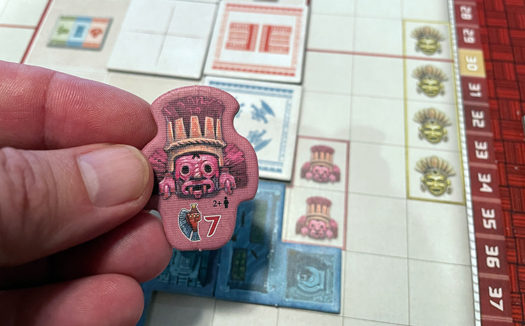
How does Founders of Teotihuacan score on our “Let’s Play Again” game meter?
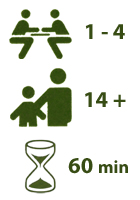 Founders of Teotihuacan is a mixed bag on our “let’s play again” game meter. On one hand, because there are so many options throughout the game, we always think we’ll “do better next game”. Which leads itself to wanting to play again. But on the flip side, because it requires weighing lots of options, by the time we’re done with a game, we’re okay to step away.
Founders of Teotihuacan is a mixed bag on our “let’s play again” game meter. On one hand, because there are so many options throughout the game, we always think we’ll “do better next game”. Which leads itself to wanting to play again. But on the flip side, because it requires weighing lots of options, by the time we’re done with a game, we’re okay to step away.
Likewise, due to what we’ve described above and what mom likes in her games (simpler choices and some elements of luck), we don’t think Founders of Teotihuacan will hit the table much as a family. But I know my monthly game night gang will find a lot to like in the game.
We’d like to thank Board&Dice for a review copy of Founders of Teotihuacan.



